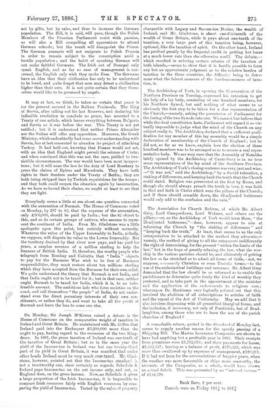On Monday, Sir Joseph M'Kenna raised a debate in the
House of Commons on the comparative weight of taxation in Ireland and Great Britain. He maintained with Mr. Giffen that Ireland paid into the Exchequer 23,200,000 more than she ought to pay, having regard to the resources of the two King- doms. In 1881, the gross taxation of Ireland was one-tenth of the taxation of Great Britain ; but as in the same year the yield of the Income-tax in Ireland was but one twenty-third part of its yield in Great Britain, it was manifest that under other heads Ireland must be very much over-taxed. Mr. Glad- stone, however, pointed out that the Income-tax standard is not a trustworthy one, since certainly as regards Schedule A Ireland pays Income-tax on the net income only, and not, as England does, on the gross income. Now,es Schedule A gives a large proportion of the Irish Income-tax, it is impossible to compare Irish resources fairly with English resources by com- paring the yield of Income-tax. Tested by the value of property chargeable with Legacy and Succession Duties, the wealth of Ireland, said Mr. Gladstone, is about one-thirteenth of the wealth of Great Britain, while it pays about one-tenth of the taxation, a very large part of this taxation being, however, optional, like the taxation of spirit. On the other hand, Ireland has profited greatly by the Imperial credit in getting her loans at a much lower rate than she otherwise could. Thg debate,— which resulted in ordering certain returns of the taxation of both islands,—seems to show that it is hardly possible to form any but an approximate judgment as to the relative burden of taxation in the three countries, the difficulty being to deter- mine what the fairest measure of the burdeusomeness of taxa- tion, is.


































 Previous page
Previous page